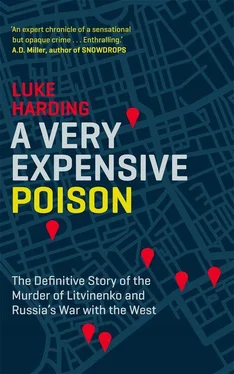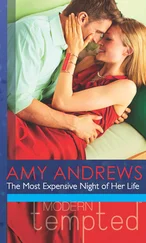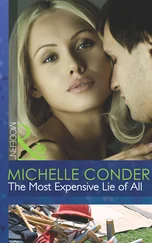Walter and I went for a walk outside. He put on the same flat cap he’d worn to his son’s drizzly funeral at Highgate Cemetery in London back in December 2006. Since then he had urged the US congress to support a resolution that blamed the Russian government for Litvinenko’s death. A public role didn’t suit him. Walter was, it struck me, a broken figure – and a pitiful one. He was afraid. ‘In Nalchik I didn’t fear because I knew everybody’s faces. Here it is different. At any moment a person could come up to you and that would be the end.’
In signed statements, Walter listed persecution in various forms by the Russian state. The police had beaten him up, he wrote, in an attempt to force him to incriminate his son. For five years he’d held one person responsible for these woes: Putin. In May 2011, Tatiana called me with further bad news. Lyuba had died. The Italian government was still refusing basic income support. Walter had moved out, into a one-bedroom flat. He was too poor to pay the electricity, so would sit on his own in the dark.
Then, in 2012, something very odd happened. Walter gave a tearful interview from Italy to Russian state TV. He told the Russian public: ‘Vladimir Vladimirovich, if you are watching this programme please forgive me for all the slander that I said and wrote about you.’ Walter said that he had come to understand that his son was a traitor. He wanted to go back home to Russia.
Walter ascribed his radical change of heart to encounters with an Orthodox priest from Rimini. In an affidavit, sworn in September 2012 before Russian officials, he said he now believed Lugovoi was innocent, and that polonium had been ‘skillfully placed’ to incriminate him. The real murderer, he suggested, was Alex Goldfarb.
It wasn’t difficult to piece together what lay behind Walter’s stagey recantation. The death of his second wife had devastated him; he’d been very attached to her; now, in the final years of his life, he felt lonely and overwhelmingly homesick. Moreover, Walter wanted to help his surviving son Maxim. After Walter’s TV confession, the family’s business affairs were said to have suddenly improved.
Astonishingly, Walter said he wanted to contact Lugovoi in Russia. Goldfarb likened the encounter – between a father and his son’s unrepentant killer – to a scene from Homer’s Iliad . ‘It has a proportion of drama akin to the Trojan War, with Priam and Achilles,’ Goldfarb said.
Priam was king of Troy; his son Paris caused the Trojan War by abducting Helen from the Greeks. The Greeks fought a war to get her back. Their best warrior Achilles kills another of Priam’s sons, Hector. Achilles refuses to give back the body and so Priam goes to the Greek camp to plead with him for his dead son’s return. He invokes memories of Achilles’ own father and says: ‘I kiss the hand of the man who killed my son.’
In Goldfarb’s analogy, Walter is the ageing Priam, seeking out his son’s killer, Achilles/Lugovoi, to make peace with him in return for personal favours. Marina Litvinenko said her father-in-law surprised and disappointed her. Contact between them stopped. ‘I was very sad,’ she said.
11
A Small Victorious War
Donbas, eastern Ukraine, Spring 2014
‘We’ve come here to help’
RUSSIAN SOLDIER, SLAVYANSK, APRIL 2014
It was once the government building in Donetsk. But in spring 2014 the city’s administrative HQ resembled a crazy Soviet theme park. Outside were barricades: a pile of tyres, razor wire and wooden crates. Stuck to them were banners with anti-western slogans. There were caricatures of Barack Obama. In one, Obama was dressed as Hitler, with a pencil moustache. In another, the US president was pictured next to Bonaparte and the Führer, and the words: ‘They all thought their nations were superior.’ In a third, Obama was a monkey.
Further inside, past a serpentine wall of debris, pro-Russian activist Vitaly Akulov stood under a Stalin flag. The Soviet leader had a Kalashnikov. He looked like a matinée idol. Wasn’t Stalin responsible for the deaths of millions of Soviet citizens? ‘Without a tough tsar who uses harsh methods you can’t build an imperium,’ Akulov replied. Other banners read: ‘Fuck EU and USA’, ‘Donbas with Russia’ and ‘Russians should be together’.
That April, pro-Kremlin separatists seized the regional administration building in Donetsk, a city of one million people in eastern Ukraine. The activists hijacked a string of other buildings across the Donbas, Ukraine’s traditional industrial heartland. They took over town halls and police stations. And proclaimed two new political entities: the Donetsk and Luhansk ‘People’s Republics’. The city of Luhansk – in the next-door region or oblast , with a population of 445,000 – was 20 miles (35 km) from the Russian border.
The rebels’ Donetsk HQ was an improvised youth hostel and centre for revolutionary operations. The eleven-storey block overlooked Pushkin Boulevard. Inside, I found a group of teenagers in balaclavas, some just fifteen or sixteen, and bearded, newly important, middle-aged men in military jackets. The Donetsk People’s Republic – or DNR – had taken over the top floor. To reach it you had to walk up a lot of stairs; the lifts didn’t work. Its leader, or ‘people’s governor’, was Denis Pushilin, a neatly dressed local businessman apparently picked by Moscow for the role.
The city police and security services had made little effort to stop this takeover. Indeed, they appeared to sympathise with it. A police car was parked outside; officers chatted happily to masked separatists. The separatists had commandeered another building opposite Donetsk’s art gallery. (It housed a portrait by Leonid Pasternak, the father of Boris, author of Doctor Zhivago , alongside nineteenth-century works by the ‘Wanderers’, my favourite Russian artistic movement.)
Forty miles (65 km) up the road north of Donetsk were signs that Ukraine’s sovereignty was fast disappearing. A pro-Russian militia unit had taken over the town of Slavyansk. They were equipped with Kalashnikovs – military-issue AK-74s – commando knives, flak jackets and walkie-talkies. They arrived in a green military truck. It bore no insignia. Who exactly were they? ‘We’re Cossacks,’ one of the group explained, as he and his comrades – one in a traditional woolly Cossack hat – posed for photos outside Slavyansk’s town hall. The commander declined to give his name.
Instead he offered me a quick history lesson, stretching back a thousand years, to when Slavic tribes banded together to form Kievan Rus – the dynasty that eventually flourished into modern-day Ukraine and its big neighbour Russia. ‘We don’t want Ukraine. Ukraine doesn’t exist for us. There are no people called Ukrainians,’ he declared. ‘There are just Slav people who used to be in Kievan Rus, before Jews like Trotsky divided us. We should all be together again.’
The man – a middle-aged commando with a bushy beard – said he had come to Slavyansk ‘to help’. He declined to say where he was from. ‘It doesn’t matter where we are from.’ He didn’t intend to kill anybody, he said. Producing a long knife, he said: ‘I can’t kill my brother Slavs.’ The mysterious Cossacks had been visiting Crimea, where they had ‘helped’ with the peninsula’s annexation. They disliked Jews but were now fighting ‘fascism’.
Ukraine’s new defence minister, Arsen Avakov, set a deadline for these enigmatic militia groups to give up their weapons. It came and went. On the road between Donetsk and Slavyansk, Ukraine’s elusive army was nowhere to be seen. Poplars and colourful apricot trees with white blossom lined the highway; the route passed crumbling collective farms and old ladies selling local produce, including jars of birch juice and saplings.
Читать дальше












